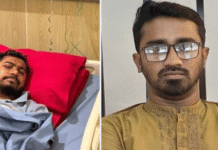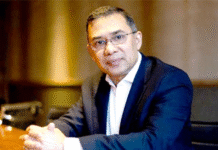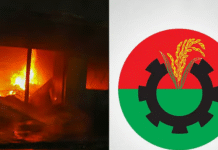Sharp divisions within the Awami League-led grand alliance have left the coalition in a quandary about how to go about handling the growing political crisis over a polls-time government, war crimes trial and the recent violence by religious fanatics.
While Ershad’s Jatiya Party, a major component of the ruling coalition, has apparently taken a completely different position from the AL’s on the Shahbagh movement and radical Islamists, other parties in the alliance allege they are neglected in the decision-making process.
This seems to be a recipe for functional disunity at a time when unity is what the ruling alliance needs the most to save the day.
Within the AL, there is little coordination among responsible leaders, and for reasons unknown, many senior leaders are not even consulted about setting strategies for the party or the government.
Members of the party’s presidium have not sat even once since its formation in January, not even after the countrywide violence sparked by Jamaat leader Sayedee’s verdict of death sentence, sources in the AL tell The Daily Star.
The advisory council, also formed in January, finally held its maiden meeting on Saturday and discussed the prevailing political situation. The party’s central working committee too has sat just once since January.
Insiders say the party is being unable to work out fitting strategies to tackle the prevailing situation as its policymakers do not sit together to discuss the crisis.
Outside the capital, many grassroots units of the ruling party are divided and lack coordination as well. Local leaders blame the central leadership for having ignored them for the last four years.
Talking to The Daily Star, many grassroots leaders have even criticised the top leaders for their Dhaka-centric activities, leaving the grassroots in disarray.
According to them, it was due to this weakness that the party’s grassroots could not put up an effective resistance against the Jamaat-Shibir’s recent terror in parts of the country beginning February 28.
RELATIONS WITH JP
Frustrated by the AL’s go-it-alone strategy, Ershad’s JP has been distancing itself from the AL for quite some time. It is perhaps because of this frustration that Ershad has made several public statements over the past two years, saying his party will no longer be a part of the alliance, and that the JP will contest the polls on its own.
Ershad, a former military dictator and current chairman of the JP, has also gone on to slam the government over its “many failures”.
As the country faces a deep political crisis, his party now opts for not joining the alliance to strengthen it and so ensuring a smooth continuation of the war crimes trial.
Instead, Ershad of late has been speaking in favour of some Islamist groups’ agitations for “saving Islam”. He has also criticised the Shahbagh protesters.
“The Jatiya Party has ideological differences with the Awami League on issues like the Shahbagh movement and anti-Islam activities by bloggers,” said Mujibul Haque Chunnu, a presidium member of the JP.
And things may get worse for the AL. Some top JP leaders are now asking Ershad to quit the AL-led grand alliance and join the BNP-led alliance, according to JP sources who spoke on condition of anonymity.
RELATIONS WITH OTHERS
Minus the JP, the AL is trying to gear up activities of the AL-led 14-party alliance to counter the BNP-Jamaat alliance.
Leaders of this alliance have their own pent-up frustrations. They say the AL has all along ignored them since taking office in January 2009 and has maintained its go-it-alone policy.
Even in some meetings that the AL has been holding with the alliance partners in the wake of the prevailing situation, top leaders of the component parties are not consulted on policy decisions.
“Only four meetings were held in the last four years where Awami League chief Sheikh Hasina was present and she talked to senior leaders of the alliance. But no issues except the war crimes trial have ever been discussed in those meetings,” says Nurur Rahman Selim, general secretary of the Gonotantri Party, a component of the 14-party alliance.
Asked to comment, Workers Party chief Rashed Khan Menon said, “We have told them [AL leaders] that we want to sit at the policy level to discuss some important issues like smooth completion of war crimes trial and imposing a ban on Jamaat politics.”
Menon said they were also insisting on the AL leaders’ opening talks to resolve the political stand-off by specifying the structure of the election-time interim government.
Jatiya Samajtantrik Dal lawmaker Shah Jikrul Ahmed echoed Menon’s view, but said they were annoyed with Ershad’s role.
He added that the 14-party might ask Ershad to clarify whether he wanted to stay in the grand alliance.
SITUATION IN AL
As per party constitution, the presidium, the highest policymaking body of the AL, is tasked with executing many important functions, including making decisions on national and international matters for the sake of unity, welfare and security.
“It’s true that the presidium plays a vital role in running the party. The meeting of the presidium could not be held on different political incidents. The Awami League chief will convene the meeting whenever she thinks it necessary,” Mohammad Nasim, himself a presidium member, told The Daily Star last Sunday.
The party’s advisory council is its “think tank” and is supposed to guide and advise the party on political, economic and social matters.
But as in the past, the “think tank” remains somewhat dysfunctional except for holding its first meeting on Saturday.
Source: The Daily Star










